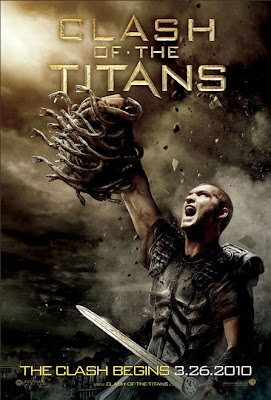Sam Worthington seems to be making a career out of playing hybrid creatures (half human and half something else) who reject their stronger, more powerful half in favour of their weaker half, as it were.
In Terminator Salvation, he sided with the humans against the machines that gave him his programming. In Avatar, he sided with the Na’vi against the humans who gave him his genetically-engineered body. And soon, in the upcoming remake of Clash of the Titans, he will, it seems, side with the humans against the gods who gave them life.
Worthington spoke a bit about this aspect of his latest role in an interview that was posted this week at HitFix.com:
“In the original, Perseus is part-man, part-God, as you know, and he accepts the God side pretty easily in the first one, accepts all the gifts the Gods give him, and to me, that wasn’t a very good message to give to my 9-year-old nephew or any kid, I think, is that you have to be a God to achieve something,” Worthington explains. “So one of these things I said to [director Louis Leterrier] and talked to Louis about was that he wants to be a man and do this as a man, and do it with other men. I think that’s a good message that anything is possible if you’re banded together as men, so that’s where it differs a lot. He’s rejecting the Gods a hell of a lot. And then the second thing is that Greek mythology, your destiny is set for you, and I thought that was another crap message to give to my nephew, because to say to him, ‘You’re already going to be destined to do this, this and this.’ I believe you can make your own fate, so we played against that, so my Perseus is, to use that word again, a boisterous belligerent kind of teenager, is how I’ve been playing him, who you tell him you can’t do something and he’ll run headlong into doing him and that gets him into a lot of trouble. He’s not the Golden Boy, he’s the teenager who has to learn how to grow up. That’s what I consider the main difference from the first film.”
In related news, Gemma Arterton, who plays an enigmatic figure named Io, had this to say about her character in an interview that was posted this week at ComingSoon.net (emphasis added):
Yeah, she’s changed quite a lot actually, and because she’s very enigmatic, I had to work out a lot of who she was myself, rather than it being in the script. I think the way I describe her now is that she’s like a guardian angel, even though she’s not heaven-sent. She’s very other-worldly, and she’s been touched by the Gods, so she has healing powers, but she’s also cursed in that she can’t age. She’s kind of trapped with these gifts that she’s been given, quite similar to Perseus actually, grappling with being human and at the same time, having these godly traits. Her role in the film is to guide Perseus through his journey and help him, mainly to realize that he should open up and embrace his Godlikeness in order to defy the Gods, which is what both of their missions are. So throughout the film, she kind of comes in and advises him and around Io, Perseus becomes quite vulnerable and we see another side to him, which we don’t see with the rest of the characters, with the boys. She’s kind of like a mother figure, rather than a romantic kind of… they’re much more like brother and sister or like a mother. She’s very protecting. She brings a real feminine touch to the film.
HitFix.com and ComingSoon.net have also posted full set-visit reports, the latter of which includes a three- or four-paragraph plot summary that highlights some of the differences between this film and the original version that came out back in 1981.
On a side note, I find it rather odd that both of these websites have capitalized the word “god” even though they always use it as a noun and never as a proper name. Is the movie studio itself setting the example here, in its press kits and so on, or did both of these websites make the same mistake independently?













